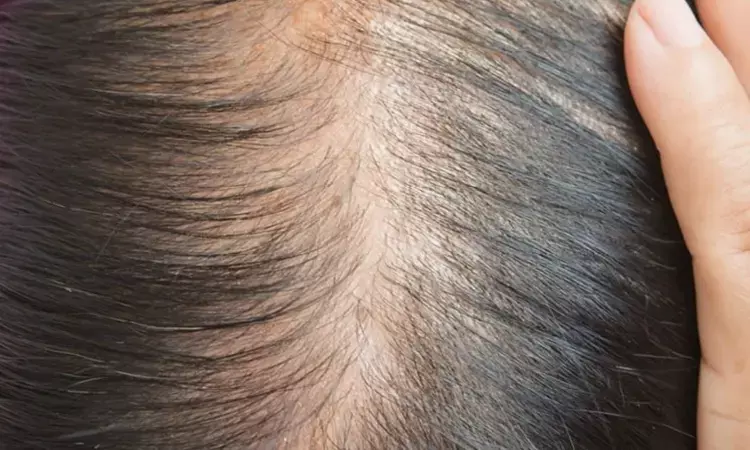- Home
- Medical news & Guidelines
- Anesthesiology
- Cardiology and CTVS
- Critical Care
- Dentistry
- Dermatology
- Diabetes and Endocrinology
- ENT
- Gastroenterology
- Medicine
- Nephrology
- Neurology
- Obstretics-Gynaecology
- Oncology
- Ophthalmology
- Orthopaedics
- Pediatrics-Neonatology
- Psychiatry
- Pulmonology
- Radiology
- Surgery
- Urology
- Laboratory Medicine
- Diet
- Nursing
- Paramedical
- Physiotherapy
- Health news
- Fact Check
- Bone Health Fact Check
- Brain Health Fact Check
- Cancer Related Fact Check
- Child Care Fact Check
- Dental and oral health fact check
- Diabetes and metabolic health fact check
- Diet and Nutrition Fact Check
- Eye and ENT Care Fact Check
- Fitness fact check
- Gut health fact check
- Heart health fact check
- Kidney health fact check
- Medical education fact check
- Men's health fact check
- Respiratory fact check
- Skin and hair care fact check
- Vaccine and Immunization fact check
- Women's health fact check
- AYUSH
- State News
- Andaman and Nicobar Islands
- Andhra Pradesh
- Arunachal Pradesh
- Assam
- Bihar
- Chandigarh
- Chattisgarh
- Dadra and Nagar Haveli
- Daman and Diu
- Delhi
- Goa
- Gujarat
- Haryana
- Himachal Pradesh
- Jammu & Kashmir
- Jharkhand
- Karnataka
- Kerala
- Ladakh
- Lakshadweep
- Madhya Pradesh
- Maharashtra
- Manipur
- Meghalaya
- Mizoram
- Nagaland
- Odisha
- Puducherry
- Punjab
- Rajasthan
- Sikkim
- Tamil Nadu
- Telangana
- Tripura
- Uttar Pradesh
- Uttrakhand
- West Bengal
- Medical Education
- Industry
Study finds earlier onset of alopecia in women who wear the hijab

USA: A recent study published in the Archives of Dermatological Research has suggested an increased risk of earlier onset of alopecia in women who wear the hijab, particularly telogen effluvium when linked with vitamin D deficiency or seborrheic dermatitis.
"Targeting these risk factors among women who wear the hijab may be considered for hair loss prevention," the researchers noted.
In the study involving 165 women, 125 of whom wore the hijab, the researchers found that those who wore the hijab experienced hair loss at a younger age and had a higher telogen effluvium prevalence, especially if they had concurrent vitamin D deficiency or seborrheic dermatitis. However, there was no significant difference in the rates of female pattern hair loss and traction alopecia between those who wore the hijab and those who did not.
Not much is known about hair loss associated with hijab-wearing, a religious head covering worn by Muslim women. Marissa S. Ceresnie, Henry Ford Health, Detroit, MI, USA, and colleagues performed a single-centre analysis to determine the association between various forms of non-scarring alopecia and wearing the hijab.
This study comprised 125 patients who wore the hijab and 40 race/ethnicity-matched women who did not wear the hijab.
The study revealed the following findings:
- Among the 165 total patients diagnosed between January 2015 and March 2022, 71 had telogen effluvium, 78 had female pattern hair loss, and 16 had traction alopecia.
- Patients who wore the hijab had a younger mean age of alopecia onset than patients who did not wear the hijab (31.5 versus 37.3 years).
- Vitamin D deficiency (OR 4.1) and seborrheic dermatitis (OR 2.9) may significantly impact the development of telogen effluvium in patients who wear the hijab.
"Our findings suggest that women who wear the hijab may experience earlier alopecia onset, specifically telogen effluvium when associated with underlying vitamin D deficiency or seborrheic dermatitis," the researchers wrote, "which highlights the importance of addressing these risk factors to prevent hair loss in this population."
Reference:
Ceresnie, M.S., Mohney, L., Seale, L. et al. The development of non-scarring alopecia in women who wear the hijab. Arch Dermatol Res 315, 2947–2949 (2023). https://doi.org/10.1007/s00403-023-02713-3
Dr Kamal Kant Kohli-MBBS, DTCD- a chest specialist with more than 30 years of practice and a flair for writing clinical articles, Dr Kamal Kant Kohli joined Medical Dialogues as a Chief Editor of Medical News. Besides writing articles, as an editor, he proofreads and verifies all the medical content published on Medical Dialogues including those coming from journals, studies,medical conferences,guidelines etc. Email: drkohli@medicaldialogues.in. Contact no. 011-43720751


